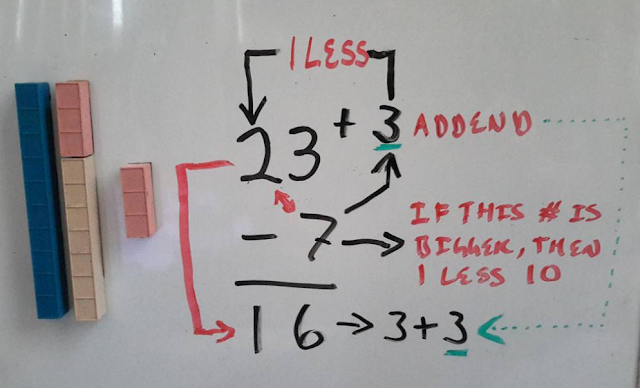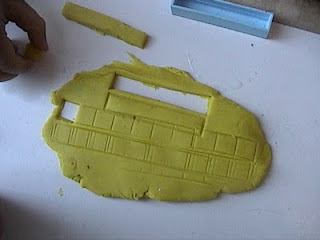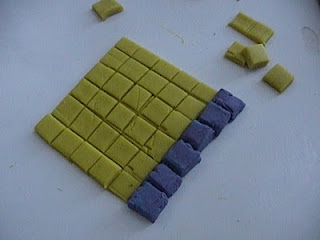In kid culture, they do know algebra is supposed to be hard. So when they see themselves doing algebra and it's easy and fun they think that they're smart. Their self talk is superior to those failing algebra, I assure you.
The idea here is to introduce concepts gradually, but you'll find that with this method we cover a lot more ground a lot faster than the traditional symbol-based approach. Using base 10 blocks makes algebra visually obvious and so easy even very little children can do it and have fun at the same time.
Compare and contrast this to symbol based approach which often results in teenage tears. The problem I see in many mah textbooks is that they introduce too many concepts at once. This makes the "cognitive load" too high and algebra becomes frustrating. Instead, using base 10 blocks they can get their hands on it and we introduce one concept at a time. The algebra is actually used to teach addends and multiplication facts. So a concept is introduced, we play with it, another concept is introduced and then we play with that. While we are learning math concepts we are counting. But again don't be confused, computation is not all there is to mathematics. Mathematics is the development of logic and reasoning.
While we are learning basic math concepts, 45 addends and 400 multiplication facts can be internalized for instant recall not just memorized and forgotten again.
 The fact that she still on her fingers doesn't matter either. Neither does the fact that she couldn't write all of these problems down quickly. In fact if we took the time for her to write them down it would slow the lesson down to the point where he wouldn't get anything done. Learning math concepts can be done whether or not the child can write, in fact her ability to write is not reflective of her ability to learn math at all. Public schools seem to have this confused. Mathematics is intrinsic to the human mind. Concept based teaching of mathematics with base 10 blocks not only speed the process up but removes a lot of the pain.
The fact that she still on her fingers doesn't matter either. Neither does the fact that she couldn't write all of these problems down quickly. In fact if we took the time for her to write them down it would slow the lesson down to the point where he wouldn't get anything done. Learning math concepts can be done whether or not the child can write, in fact her ability to write is not reflective of her ability to learn math at all. Public schools seem to have this confused. Mathematics is intrinsic to the human mind. Concept based teaching of mathematics with base 10 blocks not only speed the process up but removes a lot of the pain.In the short eight minutes we introduced some very powerful and important math concepts. The concept of the exponent, distribution; we reinforced counting by fours and nines did addends for 11 and 12 and 13. We didn't do stale worksheets. It wasn't boring, it was fun: child's play.
The deck is definitely stacked against little girls. In 2017, we still put little girls at a disadvantage. There still told math is a "guy thing." Girls are often discouraged from participating in math and science even if it's unconsciously. And mathematics is still taught to the male visual learner. Kinesthetic female learners usually have a difficult time with mathematics. But this method levels the playing field.
I charge $50 an hour or for $200.00 you get five classes. All you need is gmail vid chat and A set of blocks. This little girl could use a playmate and I have one other little girl would also like of playmate too. If $200.00 is out of your price range, for $36 a month you can get passwords that allow you access to a plethora videos and webpages that show you how to do it yourself. For example Raymond's page, shows you how to start off very young children. But there are many more password protected pages than that with PDFS and more.




























